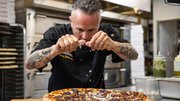Article
FCES15: How failing to adapt leads to failure in business
Jeremy Gutsche kicked off the 10th annual Fast Casual Executive Summit on Sunday evening at the Mandarin Oriental Hotel in Miami with a rousing and energetic keynote session — "Better & Faster: The Proven Path to Unstoppable Ideas."

October 19, 2015 by Travis Wagoner — Editor, Networld Media Group
Adaption is the key to success in business, said trend-hunting expert Jeremy Gutsche, when he kicked off the 10th annual Fast Casual Executive Summit Sunday at the Mandarin Oriental Hotel in Miami.
Gutsche shared what he calls his "path to unstoppable ideas." With tactics he's developed by studying tens of thousands of ideas, and frameworks he's tested while helping to solve some of the world's toughest innovation problems with his 300-plus clients, ranging from Coca-Cola to Sony to Wells Fargo, he explained how to look for the patterns of opportunity that are right in front of people. How do we overcome psychological traps that block our success? Based on his book, Better & Faster, Gutsche connected human evolution with our ability to adapt to rapid change, showing why smart people miss great ideas and what to do about it.
"It doesn't matter if you're in food, flavor, fashion or technology, the thing that blocks you from your next idea tends to be the same across all industries," Gutsche said. "The metaphor I like to use for it is farming. It's about 10,000 years of evolution as farmers. Once you find your field of opportunity — your career, the franchise you're creating, the way you put food on the table — basically, you are pre-wired to repeat and optimize decisions that led to last year's harvest."
Using Kodak, Blackberry and Blockbuster as examples, he said companies should of innovation like portfolio management, and once they start coming up with ideas, they need to start protecting the people working on them.
"Because in each of these cases (Kodak, Blackberry, Blockbuster), those companies swatted the ideas. And the ideas were huge, like smartphones, mobile computing, online video streaming, digital photography. Those are pretty big opportunities, but they missed out because they often repeated what led to last year's harvest, missing much larger opportunities. We repeat; we farm."
To break free, according to Gutsche, we need to find ways to awaken our "inner hunter" that hunter companies had at their inception, then actively look for ideas, which is about effort. Once you have an idea, back it.
"You don't test and then roll out. You perpetually test," Gutsche said. "You're always mixing your flavors up every single week."
Gutsche also encouraged the audience to ask, "What is it that you're trying to achieve and how do you redefine your most important feature?"
Restaurant operators, he said, sometimes they need to take time out of their restaurant, step back, look for clues, and when they find them, act fast.
"Since your last re-invention, how much has style, technology and culture changed, and what are your next customers thinking about your relevance?" Gutsche said.
Gutsche concluded his address by giving the audience some homework to challenge themselves to think about their re-invention.
"Peter Drucker used to say, 'It's not the questions that change, it's the answers that do,'" Gutsche said. "What I want to leave you with is that your next big idea, it's closer than you think. There are patterns in foods pointing you in the right direction. You're in an awesome and exciting industry, and as someone who can't cook, I like it even more. So recognize the patterns of success that cost you from your next ideas. To get there, be curious, be insatiable, be willing to destroy, and you will be better and faster."
About Travis Wagoner
Travis Wagoner spent nearly 18 years in education as an alumni relations and communications director, coordinating numerous annual events and writing, editing and producing a quarterly, 72-plus-page magazine. Travis also was a ghostwriter for an insurance firm, writing about the Affordable Care Act. He holds a BA degree in communications/public relations from Xavier University.
 ChatGPT
ChatGPT Grok
Grok Perplexity
Perplexity Claude
Claude












